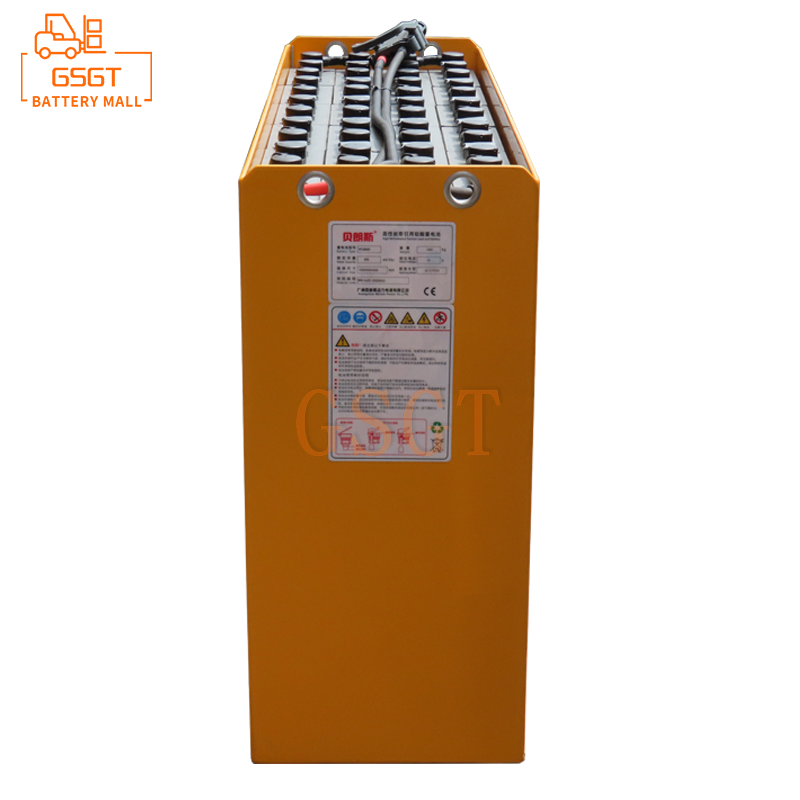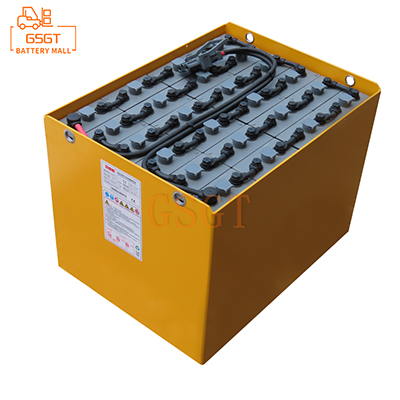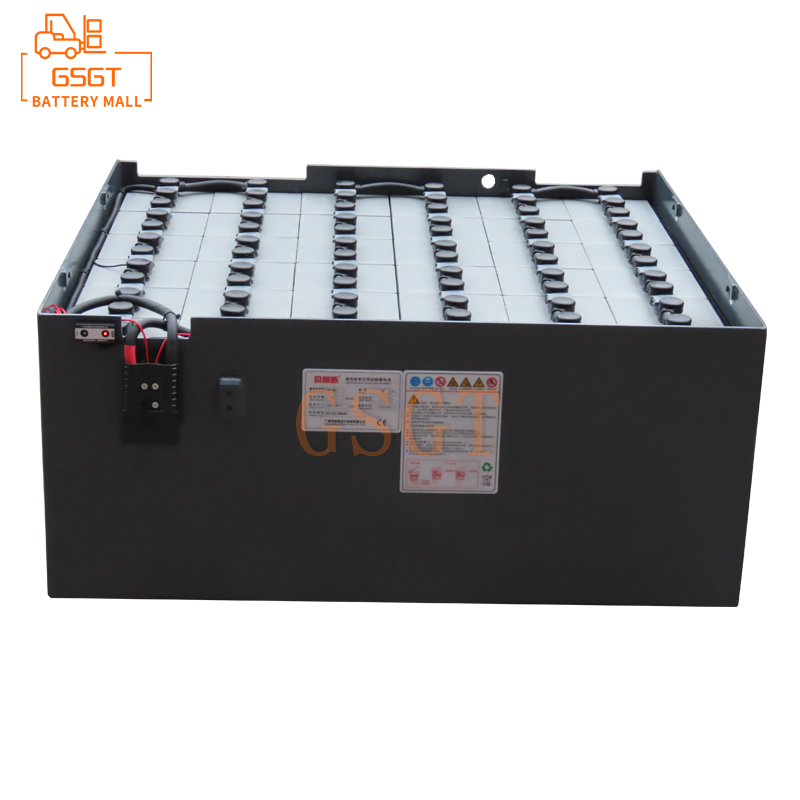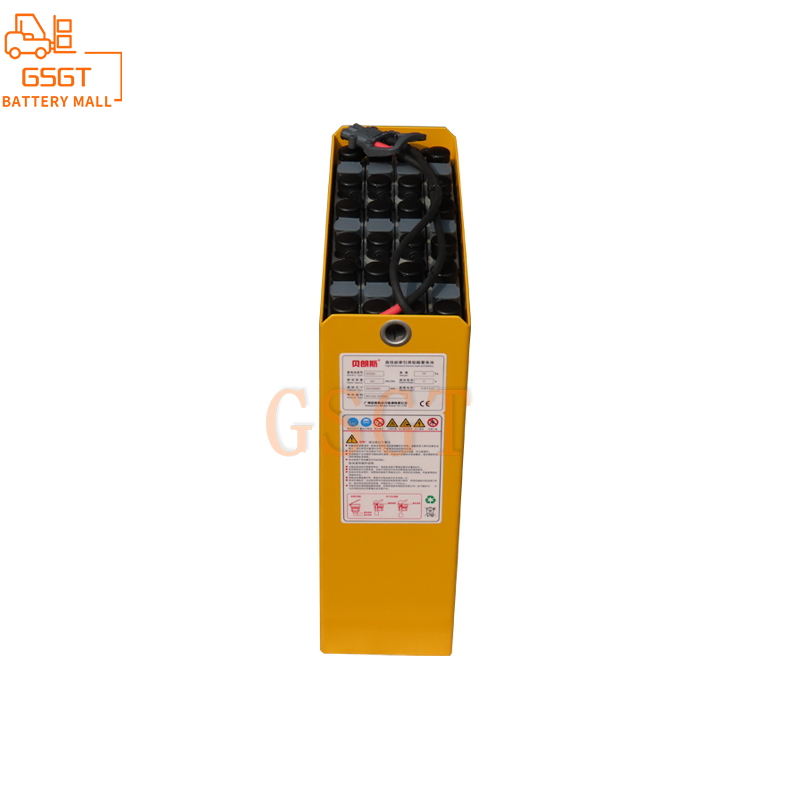Time:2025-04-21 09:18:53
Browse:677
In the field of modern industrial logistics, forklifts, as important handling equipment, the selection of their power sources is of vital importance. Lead-acid batteries have long held an important position in the power systems of forklifts. However, with the continuous development of battery technology, lithium-ion batteries, nickel-metal-hydride batteries, etc. have gradually been applied in the forklift field. A thorough comparison of the advantages and disadvantages of lead-acid batteries for forklifts with other batteries is of great significance for the rational selection of forklift power, the improvement of logistics operation efficiency and the reduction of operating costs.
1. Basic Characteristics of Lead-Acid Batteries for Forklifts
Lead-acid batteries are a type of chemical power source that uses lead and its oxides as electrodes and sulfuric acid solution as the electrolyte. It has a long history of development and mature production techniques. In forklift applications, the basic working principle of lead-acid batteries is to achieve the mutual conversion of chemical energy and electrical energy through the chemical reaction between the active substances on the positive and negative plates and the electrolyte.
The structure of a lead-acid battery mainly consists of plates, separators, electrolyte, and casing, etc. The plate is the core component of the battery and is responsible for the progress of electrochemical reactions. The partition is used to separate the positive and negative plates to prevent short circuits. The electrolyte provides the medium for ion transport in electrochemical reactions. The shell serves to protect the internal components.
2. Comparison of the Advantages and Disadvantages of Forklift Lead-Acid Batteries with Other Batteries
(1) Comparison with Lithium-ion Batteries
1. "Advantage
- ** Significant cost advantage ** : The raw materials for lead-acid batteries are widely available, and the production process is mature. Large-scale production makes their costs relatively low. In contrast, the production of lithium-ion batteries requires the use of relatively scarce and expensive metal materials such as lithium and cobalt, and the production process is complex, which often leads to the purchase cost of lithium-ion batteries being several times that of lead-acid batteries. For some enterprises with limited budgets, lead-acid batteries have obvious advantages in initial equipment investment.
- ** High safety ** : The electrochemical reaction of lead-acid batteries is relatively stable, and under normal circumstances, there will be no dangerous situations such as severe thermal runaway and explosion. However, lithium-ion batteries are prone to thermal runaway when overcharged, overdischarged, short-circuited or exposed to high temperatures, which can cause fires or even explosions, posing a significant safety hazard. In some working environments with high safety requirements, such as flammable and explosive sites, the safety advantages of lead-acid batteries are more prominent.
- ** Good compatibility ** : As lead-acid batteries have long been used in the forklift field, most forklift equipment on the market is designed to be compatible with lead-acid batteries from the very beginning. This makes lead-acid batteries have good compatibility with the electrical systems and charging equipment of forklifts, allowing enterprises to use them without making large-scale renovations to the hardware facilities of forklifts. However, replacing it with lithium-ion batteries may require upgrading and adjusting the charging interface, battery management system, etc. of the forklift, which increases additional costs and workload.
2. Disadvantages
- ** Low energy density ** : The energy density of lithium-ion batteries is usually several times that of lead-acid batteries, which means that under the same volume and weight, lithium-ion batteries can store more electrical energy. Therefore, forklifts using lithium-ion batteries can achieve longer driving ranges, reduce the frequency of charging, and improve operational efficiency. However, due to the low energy density of lead-acid batteries, the endurance of forklifts is relatively weak. Especially in high-intensity working environments, frequent charging will seriously affect the work progress.
- ** Long charging time ** : The charging speed of lead-acid batteries is relatively slow, usually taking 6 to 8 hours or even longer to fully charge. Lithium-ion batteries support fast charging technology. Some lithium-ion batteries can be charged to over 80% of their capacity in a short time, significantly reducing the waiting time for charging. Against the backdrop of the logistics industry's pursuit of efficient operations, the fast charging advantage of lithium-ion batteries makes them more competitive.
(2) Comparison with Nickel-Metal-hydride Batteries
1. "Advantage
- ** Lower price ** : The raw material cost and production cost of nickel-metal-hydride batteries are relatively high, while lead-acid batteries have a significant price advantage due to their mature industrial chain and large-scale production. For some small and medium-sized enterprises that are sensitive to costs, lead-acid batteries are a more economical and practical choice.
- ** Good low-temperature performance ** : In low-temperature environments, the performance of nickel-metal-hydride batteries will be significantly affected, with a notable decrease in battery capacity and a reduction in discharge efficiency. Lead-acid batteries can still maintain relatively stable performance in low-temperature environments. Although their capacity will also decline, compared with nickel-metal-hydride batteries, they have stronger adaptability in low-temperature conditions. This gives lead-acid batteries certain advantages in some cold regions or low-temperature working environments.
2. Disadvantages
- ** Low energy density and power density ** : The energy density and power density of nickel-metal hydride batteries are both higher than those of lead-acid batteries. This means that nickel-metal-hydride batteries can release greater power in a shorter time, meeting the high power demands of forklifts during startup, acceleration and other moments, while also providing a longer driving range. However, due to the relatively low energy density and power density of lead-acid batteries, they may experience insufficient power when forklifts are started under heavy load or frequently started and stopped, which can affect the operational efficiency.
- ** Memory effect ** : Lead-acid batteries basically have no memory effect, meaning they can be charged at any time without completely depleting their power, which will not affect the battery's performance and lifespan. Nickel-metal-hydride batteries have a certain degree of memory effect. If proper charging and discharging management is not carried out, the battery capacity will gradually decrease, affecting its service life. This requires users of nickel-metal-hydride batteries to be more cautious in battery maintenance during use, increasing the complexity of usage.
(3) Comparison with Fuel Cells
1. "Advantage
- ** Low cost ** : Currently, the research and development as well as production costs of fuel cells are extremely high, especially for hydrogen fuel cells, whose key components such as proton exchange membranes and catalysts are very expensive, resulting in a persistently high purchase cost for fuel cells. In contrast, lead-acid batteries have a very obvious cost advantage and are suitable for large-scale promotion and application.
- ** High technological maturity ** : After long-term development and application, the production technology, usage technology and maintenance technology of lead-acid batteries have all become very mature. Both the manufacturing enterprises and the users have a deep understanding of the performance and characteristics of lead-acid batteries and are proficient in their production, installation, use and maintenance. However, fuel cell technology is still in the development stage, and there are still many problems to be solved in terms of technical stability, reliability and commercial application.
2. Disadvantages
- ** Significant differences in energy replenishment speed ** : One of the major advantages of fuel cells is their fast energy replenishment speed. For instance, hydrogen fuel cell forklifts can complete the hydrogen refueling process in just a few minutes, enabling rapid and continuous operation. However, lead-acid batteries have a long charging time. Even with fast charging technology, it is difficult to reach the energy replenishment speed of fuel cells. In logistics scenarios where the continuity of operations is highly demanded, fuel cells have obvious advantages.
- ** Poor environmental performance ** : Although lead-acid batteries do not produce pollutants during use, if not handled properly during their production and recycling processes, they can cause serious environmental pollution. Lead is a toxic heavy metal. If the treatment of production wastewater and waste residue does not meet the standards, it will pollute the soil and water sources. During operation, fuel cells only produce water, causing almost no pollution to the environment. They are a truly clean energy source and have advantages that lead-acid batteries cannot match in terms of environmental protection.
3. Battery Selection Suggestions for Different Scenarios
In practical applications, enterprises should comprehensively consider factors such as their own operational requirements, budgets, and working environments to select the appropriate forklift batteries. For small and medium-sized enterprises with low work intensity, limited budget and high safety requirements, lead-acid batteries are a more suitable choice. For large logistics enterprises that pursue efficient operations, have strong endurance and certain financial strength, lithium-ion batteries may better meet their demands. In some special scenarios with extremely high environmental protection requirements and strong demands for continuous operation, fuel cells may be the future development direction. However, at present, due to cost and technological limitations, their application scope is relatively narrow.
In conclusion, lead-acid batteries for forklifts and other types of batteries each have their own advantages and disadvantages. With the continuous advancement of battery technology and changes in market demand, different types of batteries will play their respective roles in the forklift field and jointly promote the development of the logistics industry. Enterprises need to fully understand the characteristics of various batteries, make scientific and reasonable choices based on their own actual situations, and achieve the best economic and social benefits.

$3810

$3405

$4045

$1270

MESSAGE
Professional And Efficient
Security
Affordable Price
Professional Services